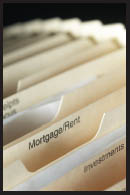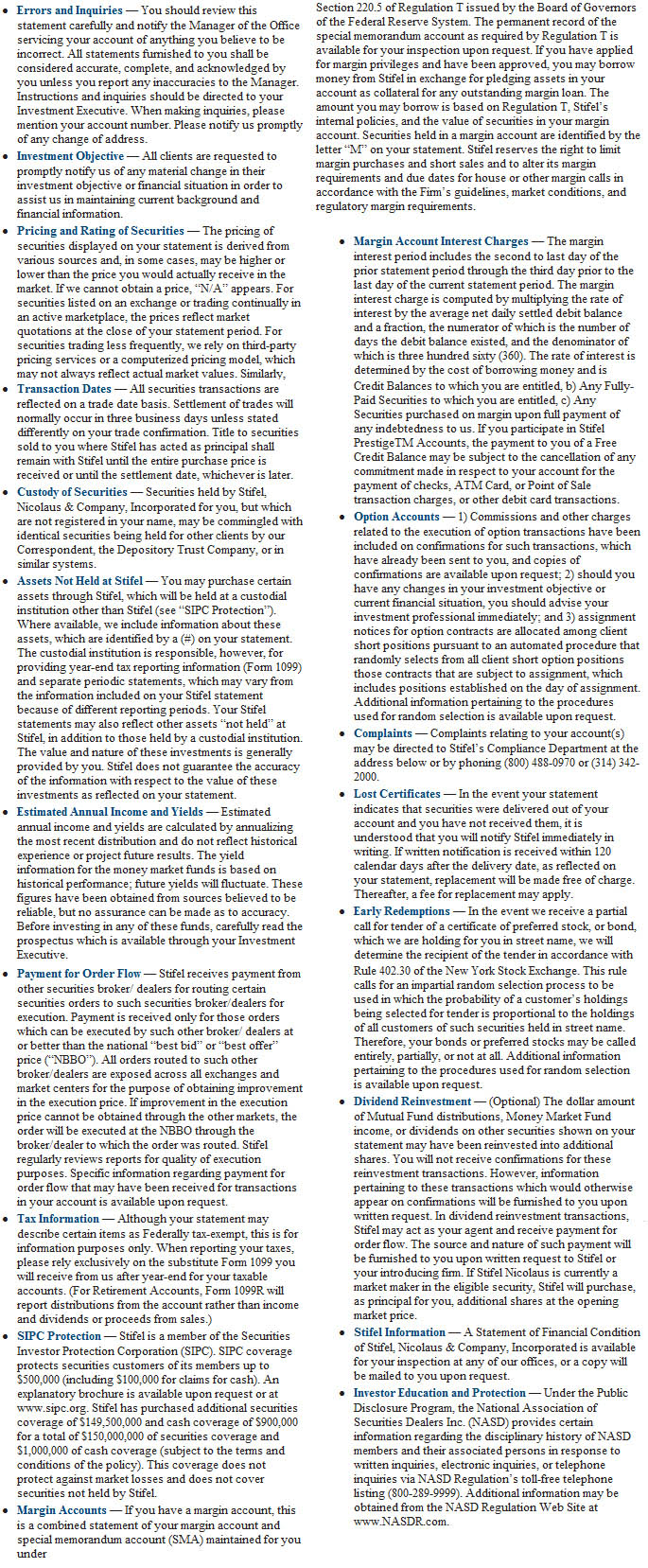|
ROLLOVER
CENTER |
| |
|
| |
STIFEL NICOLAUS |
| |
|
|
Investment StrategistTM
Protecting Your Most Important Information
April 2008
|
In March, a Southern California
thrift store received a box of clothing donated by the family of a
woman who had recently passed away. Mixed in with the various
articles of clothing was an envelope containing $30,000 in cash
that the woman had hidden away for safe keeping but never told her
family members about. Fortunately for her relatives, the thrift
store employee who found the money didn�t give a second thought to
returning it to its rightful owners.
By no means is this an isolated
incident. There are countless other stories about people who have
left cash, stock certificates, and valuables stored away in secret
locations that only they knew about. While it may have given them
peace of mind at the time to find a good hiding spot, by hiding
their information too well, they run the risk of shortchanging
their heirs. |
 |
Keeping your records in order not only
simplifies things for you, it also makes it easy for your family
members to handle your affairs should anything happen to you. This
applies not only to your finances, but also to any personal
information that would be important for your loved ones to have.
 When
it comes to important information, it�s possible to save too much or
too little. If you�re a pack rat, now is the perfect time to perform a
little spring cleaning � if you haven�t maintained thorough records,
now is a good time to get organized. And if you already have a record
keeping system in place, would it be easy for your family members to
find? And once they�ve found it, would it be easy for them to
understand? Even if your family is able to find the information, if
it�s not up to date, it�s of no use to them. When
it comes to important information, it�s possible to save too much or
too little. If you�re a pack rat, now is the perfect time to perform a
little spring cleaning � if you haven�t maintained thorough records,
now is a good time to get organized. And if you already have a record
keeping system in place, would it be easy for your family members to
find? And once they�ve found it, would it be easy for them to
understand? Even if your family is able to find the information, if
it�s not up to date, it�s of no use to them.
Getting Started
To begin, you�ll want to establish a
system for organizing your important documents and keep certain items
in a safe deposit box and the rest in a single location in your home.
Whether you use a file cabinet, a safe, or a simple accordion file,
keep all of your important information in the same place, and tell at
least one person its whereabouts. Create an individual file for every
type of record (outlined on the following pages), so that you can
easily put documents away as you receive them.
|
Note on Auction Rate
Securities
Due to recent market conditions,
certain Auction Rate Securities are experiencing no or limited
liquidity. Therefore, the price(s) for any Auction Rate Securities
shown on the accompanying statement may not reflect the price(s)
you would actually receive upon a sale at auction or in a
secondary market transaction. There can be no assurance that a
successful auction will occur or that a secondary market exists or
will develop for a particular Auction Rate Security. For
additional information, please visit our website, www.stifel.com,
to review a report entitled, �Auction Rate Preferred Market
Update.� |

V i s i o n
� P l a n n i n g
�
Focus
SNINS030801
|
| |
|
Protecting Your Most Important Information
(continued) |
|
What Should You
Keep?
Here are some
examples of important information that you�ll want to maintain in your
files:
|
Medical Information
Physician�s name and
contact information Health insurer information, including plan
name and identification number Personal health information, such
as blood type, allergies, and medications
Advisors
Financial Advisor�s
name and contact information Tax advisor�s name and contact
information
Insurance
Life insurance
company Policy number Agent�s contact information
Mortgages
Property address
Mortgage holder Contract number Address of mortgage servicer
Car Loans
Vehicle description
Loan number Loan servicer information
Credit Cards
Type of card/issuing
organization Name on card Card number Customer service contact
information Available limit Terms/other information
Bank Accounts
Name of institution
Institution�s address and phone number Account type Account number
Safe deposit box information
|
Brokerage Accounts
Name of institution Institution�s address and
phone number Account type Account number
Retirement Plans
Employer/organization Account number Service provider Key contact
with contact information
|
 |
|

Pension Plans
Employer/organization Account Number Service provider Key contact
with contact information
Estate Planning
Location of Will Attorney�s name and contact information
Executor�s name and contact information
Living Wills
Location of will
Location of health care proxy
Name and contact information of person authorized to act on your
behalf in the event you are incapacitated
Trusts
Type of trust Trustee names Financial institution Financial
institution contact information
Emergency Contacts
Names and contact information
|
|
|
During
the audit of Stifel, Nicolaus & Company, Incorporated�s 2007
financial statement, our beginning equity as of January 1, 2007,
was restated. This restatement resulted from application of an
accounting guideline issued in 1990 for purchases of businesses by
our Parent, Stifel Financial Corp., and which were contributed to
our Company. This restatement had no effect on the Company�s net
income or net capital at December 31, 2007. Additionally, the
Company was in full compliance with Net Capital Requirements
pursuant to SEC Rule 15c3-1 and computation of Customer Reserve
requirements pursuant to SEC Rule 15c3-3.
As a
result of the restatement, Stifel reported a material
weakness in its accounting for goodwill. A copy of the report and
comments by our independent accountants on the material weakness
in presenting goodwill is currently available for your inspection
at the Securities and Exchange Commission, Judiciary Plaza, 450
5th Street N.W., Washington, DC 20549, or at the Midwest Regional
Office, Securities and Exchange Commission, 175 W. Jackson Blvd.,
Suite 900, Chicago, IL 60604. A current copy of the consolidated
statement of financial condition filed pursuant to Rule 17a-5 of
the Securities Exchange Act of 1934 is available for examination
at the Chicago Regional Office of the Securities and Exchange
Commission noted above or at our principal office at One Financial
Plaza, 501 North Broadway, St. Louis, Missouri 63102. |
|
 |
| |
| |
|
Where to
Keep Your Records
In a safe deposit box
Items that are too important or
too difficult to replace should be kept in a safe deposit box.
You will want to keep copies of these items in your files at
home as well.
|
In your home
The items that
aren�t in your safe deposit box should be kept in a convenient
location in your home.
-
Bank statements
-
Bills
-
Brokerage statements
-
Credit card statements
-
Pay stubs
-
Tax returns
In your wallet
The following
items should be kept with you at all times:
-
Driver�s license
-
Auto insurance
-
Credit cards
-
Emergency contact information and health information, such as
allergies, health conditions, etc.
|
|
|
How Long Should You Keep It?
So, which things do you need to keep
and which things can you afford to get rid of? Here are some
details on how long you should hold on to certain types of
documents:
| Tax
returns and other tax records:
After seven years
|
| Pay stubs:
After one year |
| Bank
statements: After
one year (save statements related to your taxes with your tax
return for seven years |
| Brokerage
statements: Hold
until you sell the securities, then keep with your tax return
for seven years. |
| Credit
card statements:
After one year (keep statements for seven years if tax-related
expenses are documented) |
| Permanent
(whole) life insurance policy:
Never
|
| Term life
insurance policy:
After the term expires |
| 401K
statements: When
you get a new one
|
| Car title:
When you sell your
vehicle |
| Birth
certificate: Never
|
Review Your Records
As your life changes, so will the
amount of information you�ll need to keep organized. Review your
records on an annual basis to ensure that everything is up to
date. Doing so will help you ensure that you�re keeping the right
records � while giving you the opportunity to minimize clutter.
Taking the Next Step
Your Stifel Financial Advisor can
provide you with additional advice regarding the information
you�ll need to keep on hand in order to simplify your records and
make it easy to keep organized for tax season. He or she can also
provide you with copies of documents you may be missing or help
you with such tasks as transferring your paper stock certificates
to your brokerage account. Also, be sure to review your
investments with your Financial Advisor on a regular basis. Not
only will you be able to keep your information in order, but you
can help ensure that you�re staying on track to reach your
financial goals as well.
|
|
 |
|
Account
Disclosures |

|
 |
|
Stifel, Nicolaus & Company, Incorporated
�
Member SIPC and New York Stock Exchange
�
One Financial Plaza, 501 North Broadway, St. Louis, Missouri 63102
�
www.stifel.com |
|
|
|



